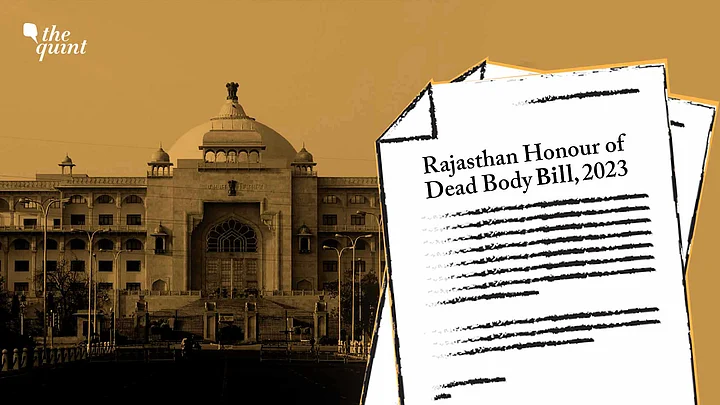The Rajasthan Honour of Dead Body Bill, 2023 raises a complex mix of legal, constitutional, and moral questions.
Section 3 of the Bill affirms the right of every person to “decent and timely last rites” in accordance with that person’s religion and custom. This is a straightforward statement of well established law, and a fundamental right guaranteed under the Constitution.
Right at the end of the section, however, the words, “as soon as possible”, seem puzzling.
The rest of the law makes it clear that the “as soon as possible” part of Section 3 is actually what this Bill is intended for. Section 4 of the Bill casts a duty on the family members of the deceased to carry out the last rites as soon as possible. Section 5 requires that the family has to take possession of the dead body when it’s handed over to them, and Section 6 insists that no family member is permitted to use the dead body for any protest or civil disobedience against the state. Family members can be punished with imprisonment and fine if they don’t take possession of the body or allow its use in a protest.
In addition, the police and the executive magistrate have been given powers under Sections 7 and 8 to take the body into their possession and even carry out the last rites of the deceased if the family members refuse to do so with the idea of using it to protest. In effect, the state is giving itself the power to take a dead body away from the custody of the family and conduct the last rites of the dead person by itself “as soon as possible.”
The Law vs Morality Conflict
Such government action was what exactly led to controversy in the Hathras (Uttar Pradesh) sexual assault case in 2020. The forceful cremation of the victim’s body, without handing it over to the family “shocked the conscience” of the Lucknow bench of the Allahabad High Court which took suo motu cognisance of the issue.
While the UP Police and executive magistrate justified it on the basis of “law and order issue,” the court came down heavily against them for forcibly cremating the victim against the family’s wishes.
Beyond the legal and constitutional dimensions, the Rajasthan bill also forces us to ask some questions about the morality of the exercise. Desecrating the dead is one of those acts almost universally condemned across cultures. Death rituals, as a structured form of grieving for the dead, are probably as old as humanity itself, if not older. To deny or deprive someone of the right to undertake such rituals for their loved ones is considered morally obnoxious.
This is why Sophocles’ play Antigone resonates with audiences thousands of years after it was first performed. In the play, King Creon of Athens decrees that bodies of “traitors” who fought against Athens should not be permitted to be buried honourably. Antigone, the sister of Polynices (who fought against Athens) plans to ignore the decree and honour the “laws of the gods” which requires the dead to be given an honourable burial. The conflict between Creon and Antigone is presented as one between law and morality, brought into sharp focus over the need to give the dead a decent burial. One sees an instance of this in real life over controversies related to the burial of militants’ bodies in Kashmir.
When Families Refuse To Bury Their Dead
While grief may be the emotion which informs the carrying out of death rituals, it is not the only emotion that accompanies death. Anger is a powerful emotion that also, on occasion, accompanies death. In Hindu mythology, when Sati, unable to bear the humiliation of her father’s mistreatment of Shiva, throws herself into the fire, Shiva’s incandescent rage knows no bounds.
Using her half burnt body, Shiva performs the tandava (dance of destruction) threatening to put an end to all of creation itself until Vishnu stops him. Similarly, the funerals of Irish Republican Army militants during “the Troubles” in Northern Ireland routinely saw large turnouts by crowds protesting continued British rule resulting sometimes in mass violence.
If the origin of grief over the dead is love, then perhaps the origin of the anger is injustice. When families refuse to bury or burn their loved ones, the anger over injustice that caused the death perhaps overwhelms their need to give their loved ones a respectful departure.
It is this fundamental aspect perhaps that the Rajasthan government has missed in framing the Bill. Far from addressing the underlying injustice, the Bill only gives the state power to compound the misery of the families by denying them their right to bury their loved ones as per their wishes.
(Alok Prasanna Kumar is a Senior Resident Fellow at the Vidhi Centre for Legal Policy in Bengaluru. He is also a member of the Executive Committee of the Campaign for Judicial Accountability and Reforms. This is an opinion piece, and the views expressed are the author’s own. The Quint neither endorses nor is responsible for them.)
